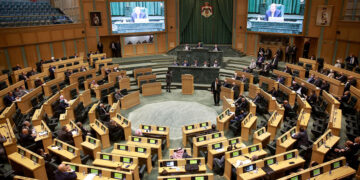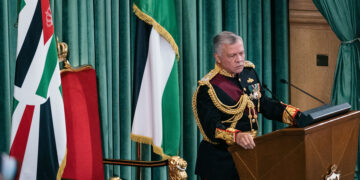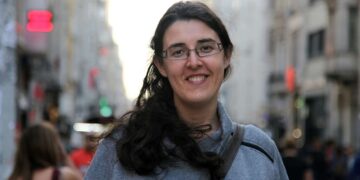عربی
Accused of "Expressing Cynicism about the Government's Achievements," Faces Death Penalty
News Release – Washington, DC, Sunday, October 18, 2020
The Specialized Criminal Court in Riyadh today again issued a postponement in the trial of peaceful religious scholar and reformer Salman Alodah, extending his pretrial detention without justification and without giving him a chance to be present in court.
Alodah, who has been in detention for three years for his peaceful speech and activism, faces the death penalty for 37 charges that include "expressing cynicism about the government's achievements," "receiving text messages that reflect antagonism to the Kingdom" and "possessing a banned book."
DAWN is publishing a detailed record of Alodah's prosecution, including his background, the charges brought by Attorney General Saud al-Mojeb and his deputy, Mohammed bin Ibraheem al-Subait, hearings in Alodah's case and his detention conditions. The judges offered no reason for continuing to delay the trial, which has been on hold for more than a year, or for keeping the 63-year old behind bars.
"The Saudi authorities have held Salman Alodah in prison for three years without sentence, because they are afraid of his popular opinions calling for sensible constitutional reforms in the Kingdom," said Sarah Leah Whitson, Executive Director of Democracy for the Arab World Now (DAWN). "For all the hype about progress in the Kingdom under Crown Prince Mohammed bin Salman, the one change he never wants is for the citizens of Saudi Arabia to have a say in how their country is governed."
Alodah's trial was due to resume today, Sunday, October 18. But when a family member arrived at the court, clerks there said that Judges Abdulaziz bin Medawi al-Jaber and Abdulaziz al-Harthy decided to postpone the continuation of the trial until November 16, in the absence of Alodah, whom prison officials did not bring to court. The judges provided no written decision, no reason for the delay and no justification for continuing to hold Alodah in pretrial detention, the family member told DAWN.
Saudi State Security officers arrested Alodah on September 10, 2017, a day after he tweeted a call for reconciliation between Saudi Arabia and Qatar, following the embargo that Saudi Arabia and the UAE imposed on Qatar. While this tweet was the immediate trigger for his arrest, the Saudi government has long persecuted Alodah for his writings promoting reform in the Kingdom. State Security forces headed by General Abdulaziz al-Huwairini detained Alodah in Dhahban prison for a year before commencing his criminal trial, although they presented no evidence to justify his pretrial detention.
They base their current charges against him, filed on September 4, 2018, on tweets in which Alodah criticized government projects, called for reforms, and demanded the release of prisoners; the fact that he attended conferences inside and outside Saudi Arabia; and statements he made criticizing certain Arab governments and saying that he felt oppressed by the Saudi government. They label these actions as breaches of the country's Anti-Cybercrime and Counter-Terrorism laws. Articles 6 and 13 of the Anti-Cybercrime Law prohibit preparing, producing, or publishing any material that threatens the "public order, religious values, public morals, and privacy…" Article 1(a) of the Counter-Terrorism Law defines terrorism to include acts that "disturb public order" and "endanger national unity."
"While Saudi Arabia is hosting the G20 and C20 Summit as a platform for international dialogue, it's locking up people like my father for demanding that Saudi's own citizens have a voice," said Abdullah Alaoudh, Gulf Research Director at DAWN and a son of Salman Alodah. "Those who care about freedom should refuse to participate in the summit events."
After holding sporadic court sessions between September 2018 and November 2019, including a March 2019 session conducted in Alodah's absence, Judges al-Jaber and al-Harthy postponed the trial to today, October 18, 2020 at the Specialized Criminal Court in Riyadh. Saudi Attorney General al-Mojeb and his deputy, al-Subait, requested the death penalty against Alodah in the first session on September, 4, 2018. Then, following the murder of Saudi journalist Jamal Khashoggi, they requested and received four postponements. On October 30, 2019, Judges al-Jaber and al-Harthy demanded a final defense from Alodah and promised a ruling on the case within weeks. Instead, they postponed the case yet again.
Alodah's family was last allowed to see him in Dhahban Prison in mid-September, following four months in which he was held in incommunicado detention. During previous visits, Alodah reported mistreatment in Dhahban Prison and in al-Haer Prison to which he was transferred, including sleep deprivation, periodic deprivation of medications, physical abuse and being held in solitary confinement for three years, since his arrest in September 2017 to this date without justification.
On one occasion, when Alodah was handcuffed, the guards threw a plastic bag of food at him without removing his handcuffs. Alodah had to open the bag and remove the food with his mouth, causing damage to his teeth. During transfers between Dhahban and al-Haer prisons, guards blindfolded him, handcuffed him, and threw him in the back of a transfer vehicle, unsecured to a seat, so that he was thrown from the ceiling to the floor of the vehicle throughout the drives.
The following Saudi officials, including prosecutors, wardens and judges, are responsible for the unlawful detention, prosecution and mistreatment of Alodah:
- Prosecutors Saud al-Mojeb and Mohammed al-Subait used their prosecutorial discretion to prosecute Alodah for peaceful speech and activism protected by international law, to arbitrarily keep him in pretrial detention and to request the death penalty.
Saud al-Mojeb, Attorney General of Saudi Arabia
- Brigadier-General Adel al-Subhi, warden of Dhahban Prison, and Colonel Saed al-Salloum, warden of al-Haer Prison, are responsible for Alodah's mistreatment in detention.
Colonel Saad al-Salloum, Warden of al-Haer Prison (General Intelligence Directorate Prison in al-Haer)
- Major General Salah al-Jutaili, Director of the Legal Department at the Presidency of the State Security, oversees State Security prosecutions, interrogations and treatment of detainees in State Security facilities such as Dhahban and Haer. Al-Jutaili has overseen Alodah's interrogations and prosecution as well as his mistreatment in prison.
- Judges al-Jaber and al-Harthy postponed trial sessions for long periods of time without justification, lengthening Alodah's pretrial detention, and held a court session in Alodah's absence, in breach of Saudi and international law.
Abdul Aziz bin Safar al-Adhiani Al-Beniusi al-Harthi, Judge at the Specialized Criminal Court in Riyadh
Abdulaziz bin Medawi al-Jaber, Judge and Deputy President of the Specialized Criminal Court in Riyadh
The international community should note these persons responsible for the human rights abuses against Salman Alodah and take appropriate action to sanction them for their roles. Governments should consider denying them visas to travel and freezing any assets they may own, and international and non-governmental organizations and academic institutions should ensure they are not entitled to participate in conferences, trainings, tours, or other exchanges.
"Prosecutor Saud al-Mojeb is a cog in the machine of the Saudi government's repression of its citizens. His role may be small, but he is trying to send this innocent man, Salman Alodeh, to death," said Alaoudh. "He and his co-conspirators, like Prosecutor al-Subait and Brigadier-General al-Subhi, should not be able to reap the perks of their fancy titles while traveling incognito outside their country. They deserve condemnation, not respect."
Saudi Arabia's laws prohibit freedom of association, freedom of speech, and freedom of religion. Since King Salman's ascension to power in 2015 and the emergence of his son Mohamed bin Salman as crown prince, the government has undertaken wide scale jailings of critics and perceived rivals. Two years ago this month, government officials brutally murdered and dismembered Saudi journalist Jamal Khashoggi in the Saudi consulate in Istanbul.
More information about Alodah's case is available on DAWN's web site.





































